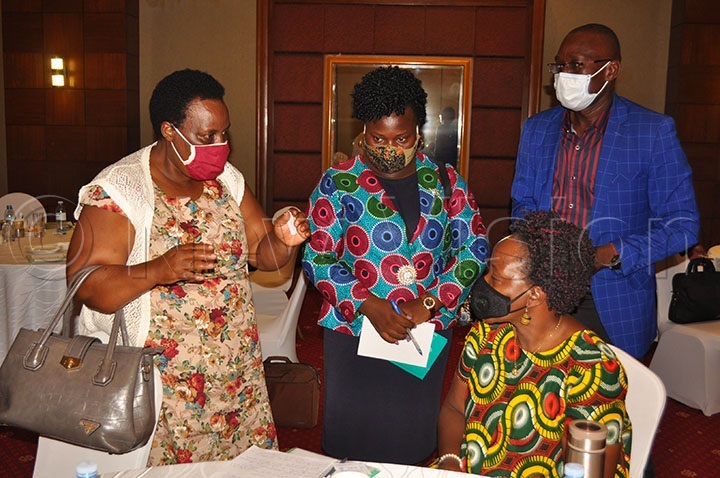Cultural leaders in drive to fight violence against women and girls
During the lockdown there was a spike in gender-based violence with women and children mostly getting affected and some of the cases even claiming lives.
CULTURE| VIOLENCE AGAINST WOMEN
Cultural and traditional leaders in Uganda are to promote the use of positive cultural practices to fight and end violence against women and girls amid concerns that African culture is being relegated in favour of ill modern cultures.
The Ministry of Gender, Labour and Social Development, UN Women and The Cross-Cultural Foundation Uganda recently held discussions with the Prime Ministers of the different cultural and traditional institutions in Uganda on how they can harness cultural resources to end violence against women and girls.
"Violence against women and girls is not a cultural issue but a social value issue.""In a home today you find the children, men, and women operating independently and not as a unit as it should be," says the Prime Minister of Bunyoro Kingdom Andrew Byakutaga.
"We have borrowed cultures which have suffocated our positive African cultures, that would have protected women and girls against violence," adds Rt. Hon. Rev. Tomasi Kamuhanda Deputy Prime Minister in the Bwamba Kingdom.
During the lockdown there was a spike in gender-based violence with women and children mostly getting affected and some of the cases even claiming lives.
Between March 30 and April 28 alone 3, 280 cases of gender-based violence were reported to the Police in addition to 283 cases of violence against children. In the five months of the lockdown, Uganda had registered more than 21,000 cases of child abuse.
The institution of Traditional or Cultural Leaders Act, 2011 defines the role of traditional or cultural leaders as that of promoting and preserving the cultural values, norms and practices which enhance the dignity and wellbeing of the people and that of promoting the development preservation and enrichment of all people in the community.
However, the Permanent Secretary in the Ministry of Gender, Labour and Social Development Aggrey Kibenge says a lot more remains to be done including tackling concerns over the growing moral decadence within our society.
"Unfortunately culture faces the threat of globalisation with dire consequences especially on the dot.com generation. We need to continue working together to urgently address the challenge brought about by a scientifically and technologically growing and connected world," he says.
The Prime Minister of Bunyoro says there is need to encourage family value to ensure families operate as a loving and peaceful single unit.
Vincent Ssenyondo who is in charge of Strategic Partnerships in Buganda Kingdom said if cultural and traditional institutions go back to the basics to promote best cultural practices, violence against women and girls will come to an end.
The Prime Minister of the Acholi Chiefdoms Ambrose Olaa adds within the provisions of culture and traditions there are mechanisms based on cultural norms, values and practices that has for generations defined the way men and women relate in an environment peacefully.
He says because of the many changes that have occurred in the name of advancement, people are abusing relationships. The fact that many people have abandoned traditional practices that protected women and girls and any other human being, you find that people are engaging in acts of violence.
"Given the current trends we see an increasing need for cultural and tradition to play a greater role in minimising and limiting violence against women and girls,' he says.
Kibenge says traditional and cultural leaders are effective partners in instilling positive values including hard work, mutual respect, peaceful co-existence, and a positive attitude and mindset to development. He referred to culture as a unique social capital and a prerequisite for development.

Kibenge urged the traditional and cultural leaders to also consider establishing cultural or creative hubs to engage young people and ensure our cultural values are promoted for mindset change.
The Deputy Executive Director of the Cross-Cultural Foundation of Uganda Barbra Babweteera says according to the recent research that they have carried out, there are numerous positive cultural practices if revived and promoted that can be used to end violence against women and girls.
"There are similarities of cultures across Africa. Traditional or cultural leaders can borrow the good cultures to end violence against women and girls."
"It's within the powers of cultural or traditional leaders to decide positive cultures they want to adopt and let their communities especially young people know," says Babweteera.
The research reports plus the position paper on culture and the Marriages Bill will be released next month during the 16 days of activism.
The meeting between the traditional and cultural institutions Prime Ministers and the Ministry of Gender, Labour and Social Development, UN Women and The Cross-Cultural Foundation Uganda on Friday also made a case for the adoption of the Consortium of Traditional Leaders in Africa (COTLA) Uganda Chapter to eliminate violence against women and girls.
Established in 2018, COTLA aims to end child marriage, Female Genital Mutilation and other harmful practices towards women and girls in Africa by 2030.